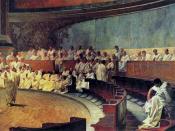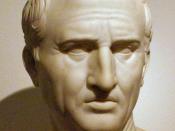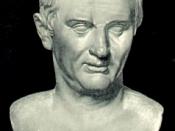Marcus Tullius Cicero of the Roman Empire was not only a lawyer and politician, but was a writer and a philosopher. With his great orations, and essays on matters such as old age and friendship, it comes as no surprise to know that such a great intellectual wrote the following quote, which I will break down and explain, as I understand:
"History is the witness that testifies to the passing of time, it illuminates reality, vitalizes memory, provides guidance in daily life and brings us tidings of antiquity."
The first part of the quote, "History is the witness that testifies to the passing of time," is simple personification, a meaning to the word "history," yet it is a more in-depth definition than what can be found in dictionaries. According to Cicero, time is a "witness" to events, but unlike humans, animals, or places, it will always be there to tell its story.
Although we may think if it simply as a subject of study, history, to Cicero, is there to record what time has seen.
The next part, "it illuminates reality, vitalizes memory, provides guidance in daily life" is explaining what history does not for the past, but for us. Cicero believed that it brings into perspective what is happening now, while at the same time reminding us of our past, expressed with "illuminates reality, vitalizes memory". Cicero then reminds us that we can learn from our past, using our history to guide us, by knowing our mistakes as well as our achievements.
Cicero ends this quote by saying, "[history] brings us tidings of antiquity." Tidings meaning news, and antiquity meaning ancient times, he finally uses the known definition of history, explaining what all people understand it to be. In my opinion, the final part of this quote contrasts the...


